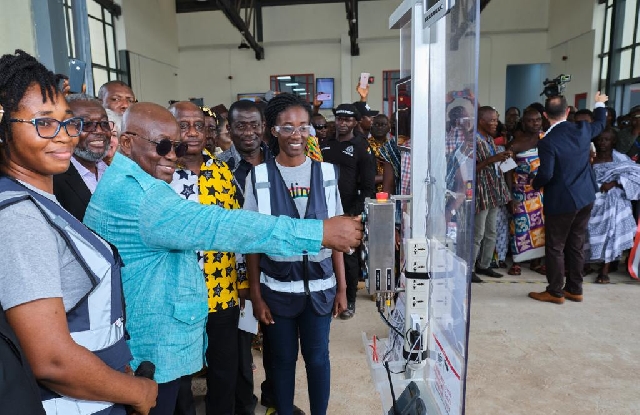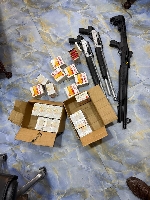Mampong: Akufo-Addo opens 2nd medical drone delivery base
 Launch of Drone
Launch of Drone
President Nana Akufo-Addo on Thursday, 10 October 2019 officially launched Ghana’s newest medical drone delivery base at Mampong during a tour of the Ashanti Region.
This is the second of four medical drone delivery bases earmarked for construction to help expand access to critical and life-saving medicines for patients across Ghana.
Zipline, a California-based robotics company, operates the medical drone delivery service with support from Gavi, the Vaccine Alliance, the Bill & Melinda Gates Foundation, the UPS Foundation, Pfizer and other partners.
Like the first facility which was opened in Omenako, Eastern Region, the Mampong operation uses drones to make on-demand and emergency deliveries of 12 routine and emergency vaccines as well as 148 blood products and critical medicines.
Ghana’s Expanded Programme on Immunisation (EPI) will supply Zipline with Gavi-supported vaccines such as Yellow Fever, Polio, Measles & Rubella; Meningitis, Pneumococcal; and Diphtheria & Tetanus, among others, for delivery.
EPI will also leverage Zipline’s delivery service for future mass immunisation programmes in the country.
The service will operate seven days a week with the goal of delivering up to 500 health facilities in the Ashanti Region. The third drone delivery base will be launched later this year and the fourth soon after that.
Since launching in April of 2019, the Omenako base has made more than 1,300 aerial deliveries across the Eastern Region to deliver more than 7,000 critical and emergency medicines to patients in need and helped to save many lives.
Omenako is now serving 52 health facilities with many more expected to be added over the coming weeks, as new routes are approved, and facilities are trained.
By April of 2020, all four bases will make up to 600 on-demand delivery flights a day on behalf of the government of Ghana to close to 2,000 health facilities across the country.
“When we said we were going to use drones to deliver essential medical health products, the naysayers said it was not possible. Today, many of us are seeing how impactful this service has been just within the past five months of its operations,” President Akufo-Addo, said.
He added: “Every single life in this country is precious. Every mother, every child, every parent, every person. We must do everything within our means to ensure that each and every citizen of Ghana has access to the quality healthcare they deserve.”
“Ghana has become a world leader in using drones to increase healthcare access and save lives. And other countries are taking note,” said Zipline CEO Keller Rinaudo.
“Working together, we’ve already helped to save many lives. And we’re determined to help save many more in the years to come.”
The Global Problem
Access to vital health products around the world is hampered by the last mile problem: the difficulty of matching the supply of medicine from central storage to the demand at urban and rural health facilities. All too often, people requiring life-saving care do not get the medicine they need when they need it. Zipline's medical drone delivery system is designed to eliminate this problem.
How Zipline Works
To increase access and reduce medical waste, key stock of blood products, vaccines, and life-saving medications are stored at Zipline's base for just-in-time delivery. Health workers place orders by text message or call and promptly receive their deliveries in 30 minutes on the average.
The drones take off from and land at Zipline's base, requiring no additional infrastructure or manpower at the clinics they serve. The drones fly autonomously and can carry 1.8 kilos of cargo, cruising at 110 kilometres an hour, and have a round trip range of 160 kilometres—even in high-speed winds and rain.
Deliveries are made from the sky, with the drone descending to a safe height above the ground and releasing a box of medicine by parachute to a designated spot at the health centres it serves.
Zipline funds the technology and infrastructure. The cost of establishing the new bases in Ghana was supported through partner contributions. The government of Ghana, with the generous support of corporate social responsibility contributions, pays Zipline only for the medical delivery service itself.
Source: ClassFMonline.com
Trending News

Sam George: Ghana, Zambia forge major tech and AI partnerships in ‘digital marriage’ deal
13:45
A/R: Police arrest suspect, seize suspected narcotic-laced drinks at Akyeremade
17:13
Ghana Medical Trust Fund pays GHS1.14m for life-saving heart surgeries for children at Korle-Bu
06:27
Tema East MP inspects progress of work on Kpowulunor–Zigishore–Chemu Lagoon bridge road project
10:26
JHS pupil found dead at Kwahu Bepong, police launch investigations
11:05
PRINCOF calls for dialogue over UTAG demands on GTEC leadership
11:40
Police intercept arms and ammunition in Accra after suspect flees surveillance
13:00
OSP: We’ve saved Ghana 20 times more than invested in us
08:37
Ghana, Zambia to review import lists to boost intra-African trade
13:42
24-hour economy has become a policy cliché – Dr Stephen Amoah tells Parliament
17:00




